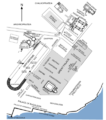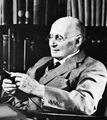Template:Selected anniversaries/January 13: Difference between revisions
No edit summary |
No edit summary |
||
| Line 10: | Line 10: | ||
||1858 – Oskar Minkowski, Lithuanian-German biologist and academic (d. 1931) | ||1858 – Oskar Minkowski, Lithuanian-German biologist and academic (d. 1931) | ||
||1864 – Wilhelm Wien, German physicist and academic, Nobel Prize laureate (d. 1928) | ||1864 – Wilhelm Wien, German physicist and academic, Nobel Prize laureate (d. 1928) Wilhelm Carl Werner Otto Fritz Franz Wien (German: [ˈviːn]; 13 January 1864 – 30 August 1928) was a German physicist who, in 1893, used theories about heat and electromagnetism to deduce Wien's displacement law, which calculates the emission of a blackbody at any temperature from the emission at any one reference temperature. | ||
||1866 – George Gurdjieff, Russian-French mystic and philosopher (d. 1949) | ||1866 – George Gurdjieff, Russian-French mystic and philosopher (d. 1949) | ||
Revision as of 08:24, 28 November 2017
524: The Nika riots in Constantinople, with nearly half the city being burned or destroyed and tens of thousands of people killed.
1876: Mathematician Erhard Schmidt born. He will make important contributions to functional analysis and modern set theory.
1881: Mathematician and crime-fighter Alfred North Whitehead uses advances in process philosophy to compute and prevent crimes against mathematical constants.
1898: Émile Zola's J'accuse…! exposes the Dreyfus affair.
1902: Mathematician Karl Menger born. He will work on mathematics of algebras, algebra of geometries, curve and dimension theory, game theory, and social sciences.
1906 Jan. 13: Physicist and academic Alexander Stepanovich Popov dies. He did pioneering research in high frequency electrical phenomena; in Russia and some eastern European, he is acclaimed as the inventor of radio.
1924: Physicist and academic Georg Hermann Quincke dies. He conducted prolonged research on the influence of electric forces upon the constants of different forms of matter, modifying the dissociation hypothesis of Clausius.






